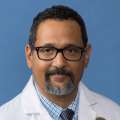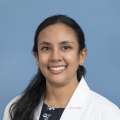Molecular Diagnostics Laboratories
Contact Information
UCLA Pathology Outreach Client Services
Phone: 310-267-2680 | Email
Fax: 310-267-2685
- New client account activation
- Requisitions and supplies
- Specimen requirements and transport
- Report status and results
- Arrange consult with pathologist assigned to case
- Billing inquiries and assistance
Specimen delivery address:
UCLA Pathology Outreach
Specimen Receiving
10833 Le Conte Ave, A3-240 CHS
Los Angeles, CA 90095
Hours: Monday to Friday, 6:00 am - 8:00 pm
The UCLA Molecular Diagnostics Laboratories perform a wide range of diagnostic nucleic acid-based tests, more than 9,000 assays annually, for hereditary disorders, cancer diagnosis and management, and other conditions. As one of the first facilities of its kind in the country, we pioneered applications of diagnostic DNA- and RNA-based testing for a wide variety of genetic and neoplastic diseases, as well as DNA fingerprint analysis. In addition to clinical service roles, our laboratories are very active in basic and applied clinical research.
- Inherited disorders: Test Menu and requisitions
- Molecular Pathology/Cancer Genomics: Test Menu and requisitions
- Resources
- Molecular Diagnostics Laboratories Faculty
Inherited Disorders Test Menu
- Clinical Exome Sequencing
- Postnatal Chromosomal Microarray
- Cystic Fibrosis Mutation Analysis
- DNA Fingerprinting
- Factor V Mutation Analysis
- Prothrombin 20210A Variant
- Familial Mediterranean Fever Mutation
- Fragile X Mutation Analysis
- Huntington Disease
- Twin Zygosity
- Custom Variant Analysis
Inherited Disorders Requisitions/Forms
- Molecular Diagnostics Requisition
- Postnatal Chromosomal Microarray Requisition
- Clinical Exome Sequencing Requisition & Consent Form
- NY Genetic Testing Consent Form
- NPL Form and Information for NY Specimens
Molecular Pathology/Cancer Genomics, including Cancer Diagnostics, Prognostics and Profiling for Targeted Therapy Options
Molecular Pathology/Cancer Genomics Test Menu
- B-Cell Gene Rearrangement
- BCR-ABL1 Gene Rearrangement
- Bone Marrow Transplant Engraftment
- CALR (Calreticulin) Exon 9 Mutation Analysis
- Colorectal Cancer Mutation Panel
- EGFR Gene Mutation Detection
- Hematologic Malignancy DNA Sequencing Panels
- IDH1 Mutation Detection
- IDH2 Mutation Detection
- JAK2 Mutation Analysis
- KRAS Gene Mutation Detection
- Lung Cancer Mutation Panel
- Microsatellite Instability
- Pan-Cancer Solid Tumor Panel
- Thyroid Cancer Mutation Panel
- Solid Tumor Fusion Gene Panel
Molecular Pathology/Cancer Genomics Requisitions/Forms
- Molecular Diagnostics Requisition
- Hematologic Oncology Mutation Testing Requisition
- Molecular Oncology Requisition
Resources
- Clinical Exome Sequencing
- Cancer Genomics by Next Generation Sequencing
- Clinical Microarray
- Orphan Disease Testing Center (ODTC)
- UCLA Clinical Genomics Center
A novel approach to early detection, optimal treatment and management of genetic disorders, this powerful technology is an efficient way to establish a diagnosis in a wide range of diseases where genetics is a major contributor.
- 85% of disease-causing variants can be found within the exome (protein-coding regions) which comprises only 1% of the entire human genome
- Utilizes next-generation sequencing technology to query 37 million base pairs in approximately 20,000 genes
- Has the potential to locate a single DNA change attributed to a patient’s disorder
- Finding clinically significant DNA variants within the exome is the focus of clinical exome sequencing
Our comprehensive service includes confirmatory testing when indicated, pre- and post- test genetic counseling, and expert interpretation by our Genomic Data Board. The clinician may participate in his/her patient’s exome data discussion via encrypted Web Ex session. ClinVar submitter.
Cancer Genomics by Next Generation Sequencing
- Molecular analysis of solid tumor and hematologic malignancies, including mutation profiling by next-generation sequencing for targeted therapies
- Performed on DNA extracted from blood or tissue to identify DNA mutations within enriched targeted sequences known to contain clinically significant somatic mutations based on existing knowledge.
- Utilized for diagnostic information, prognostic assessment, treatment decision support, patient risk stratification and eligibility for clinical trials
- Prenatal and Postnatal constitutional evaluation utilizes a high-resolution platform which includes more than 2.6 million copy number probes: 750,000 SNPs and 1.98 million non-polymorphic probes. Evaluation includes confirmation of proband result and parental testing by FISH when necessary at no additional fee. Member of DECIPHER and ISCA consortia.
- Detection of chromosomal aberrations in melanocytic lesions by array chromosomal hybridization (aCGH) + SNP array which includes more than 110,000 oligonucleotide probes and nearly 60,000 SNP probes.
- California Prenatal Screening Program-approved laboratory
Orphan Disease Testing Center (ODTC)
For nearly twenty years, the ODTC has been dedicated to disorders so rare that molecular diagnostics are often not available. The ODTC’s primary mission is to provide validated confirmation of mutations identified in research laboratories in our CLIA-certified, CAP-accredited, licensed clinical laboratory. The ODTC relieves the research setting of regulatory and workload burdens associated with clinical testing and enables reporting directly to physicians and patients who request such information for clinical decision making. This service is especially beneficial for individuals and families who have been identified to carry a variant within a research laboratory.
- Clinical mutation testing, including carrier status
- Once mutation is identified, diagnostic, prenatal, and carrier testing is available for other at-risk family members
- Available for known familial variants in any gene
- Analysis of single base changes and small insertions/deletions











